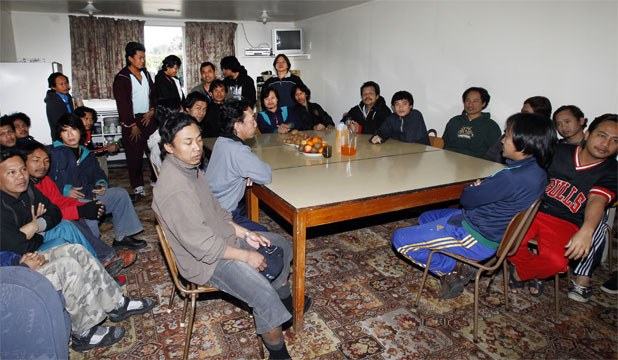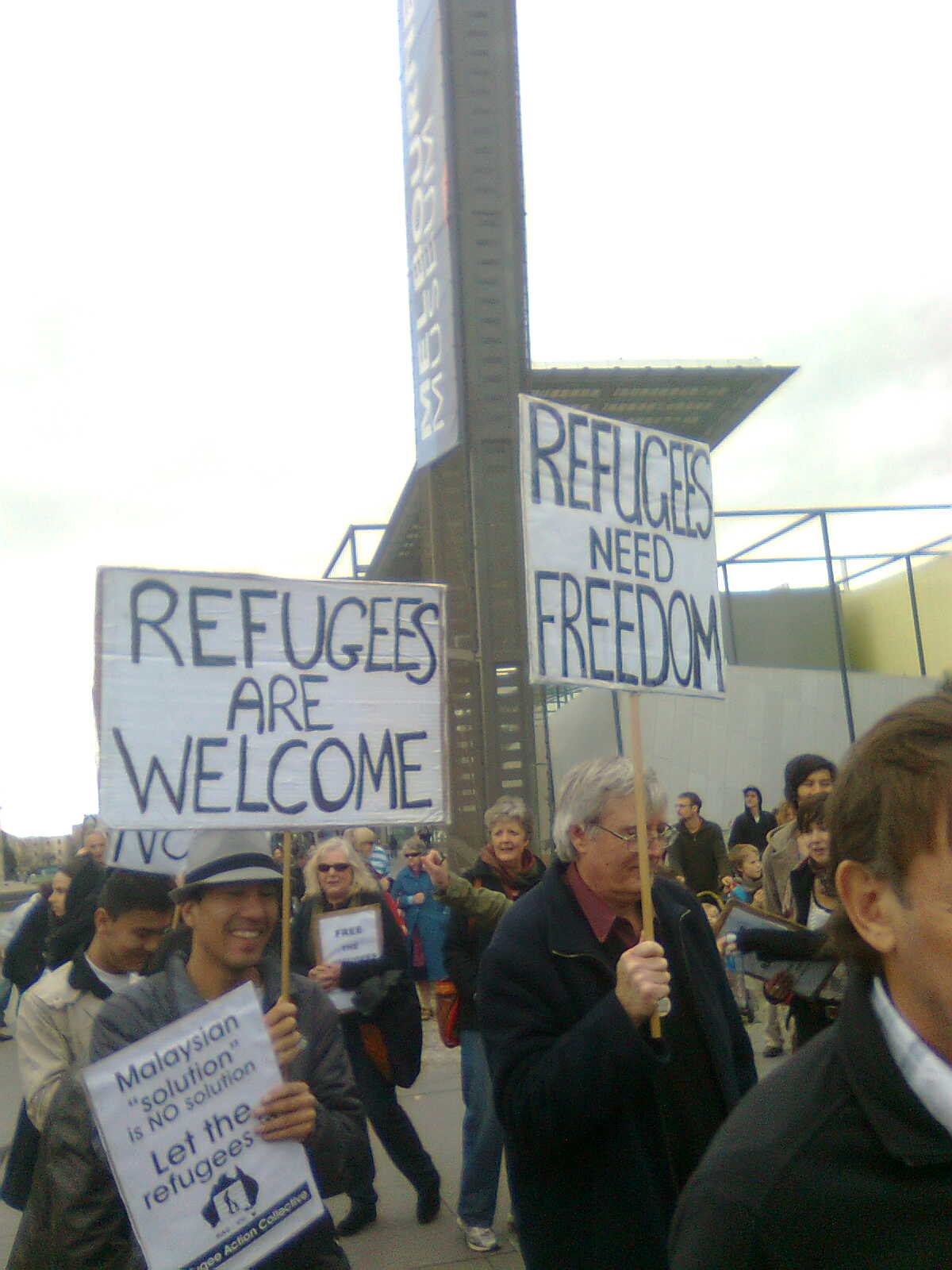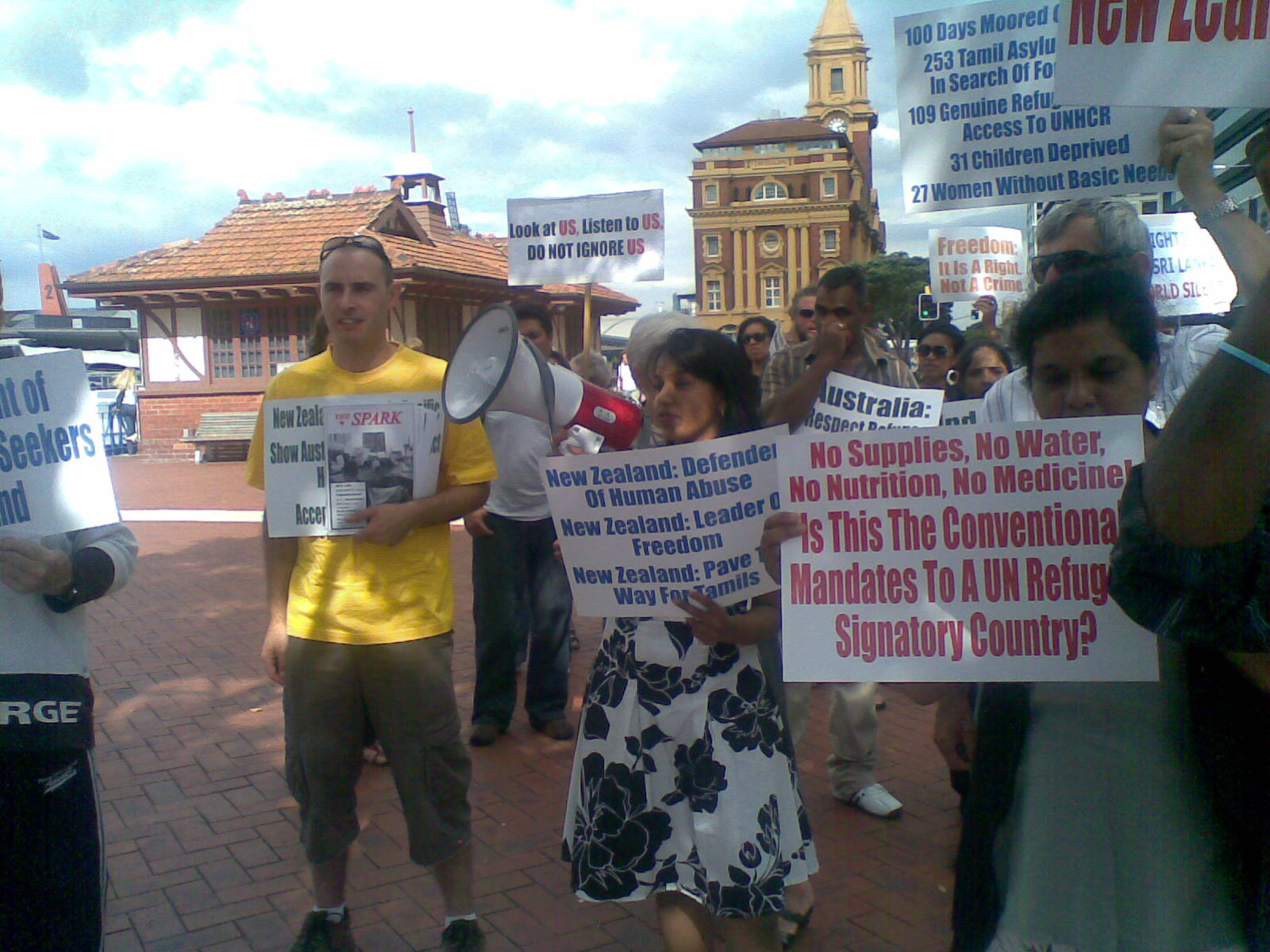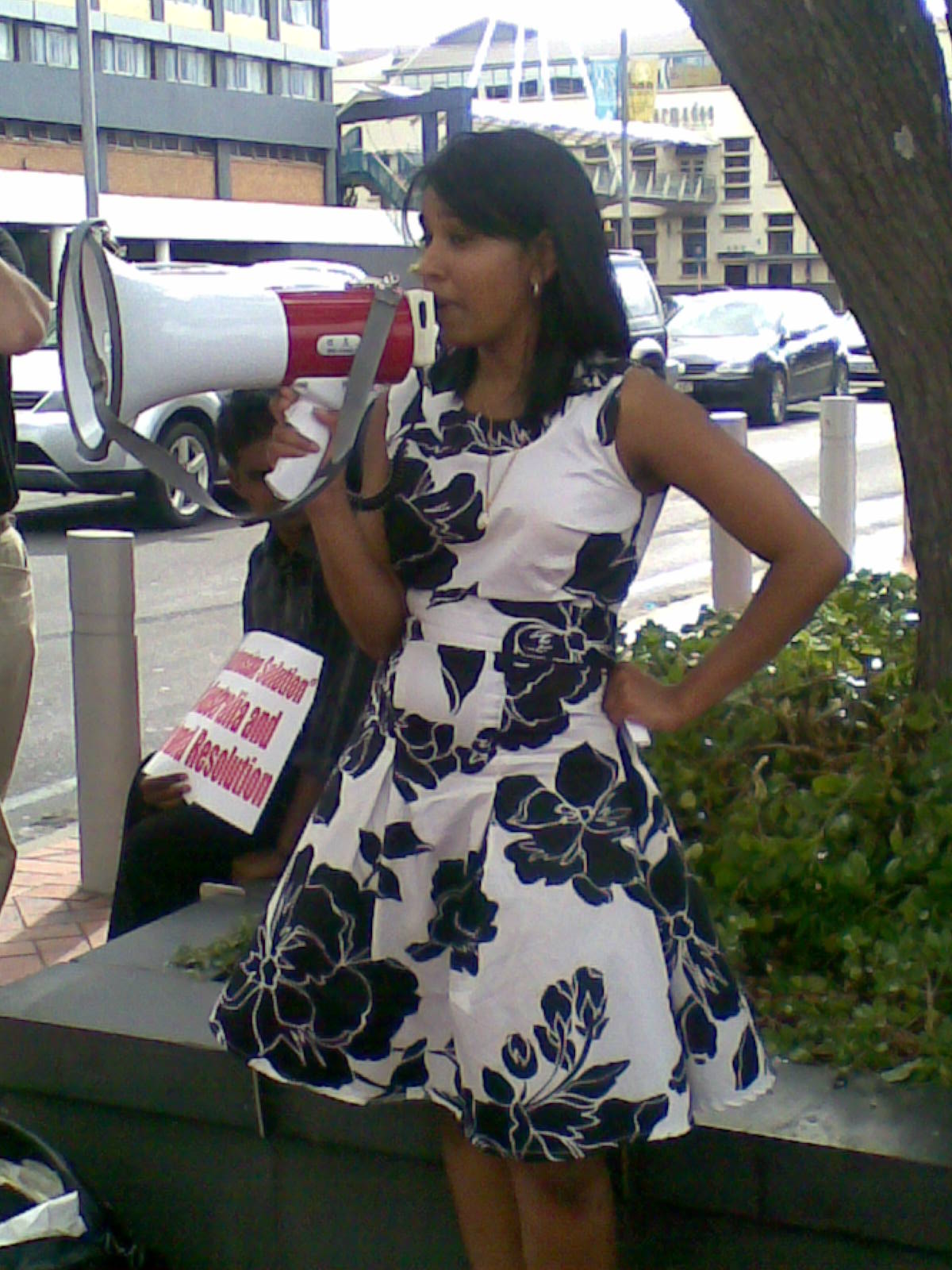 32 Indonesian fishermen previously working aboard the Korean fishing vessel Oyang 75 are currently ashore in Christchurch. These workers are seeking redress for unpaid wages and other violations of their rights. Government policy mandates that the same terms and conditions be given to workers on foreign charter vessels in New Zealand waters as to local citizens, but most members of the Indonesian crew are recieving annual incomes of between $6,700 and $11,600, well below the minimum wage.
32 Indonesian fishermen previously working aboard the Korean fishing vessel Oyang 75 are currently ashore in Christchurch. These workers are seeking redress for unpaid wages and other violations of their rights. Government policy mandates that the same terms and conditions be given to workers on foreign charter vessels in New Zealand waters as to local citizens, but most members of the Indonesian crew are recieving annual incomes of between $6,700 and $11,600, well below the minimum wage.
The crew recently used what little money they have to appeal their looming deportation. Not currently working and not eligible for welfare in New Zealand the workers are reliant on donations of food and money. Workers Party Christchurch branch organiser Byron Clark and branch secretary Kelly Pope met with the crew on Saturday (Aug. 13) and delivered 20kg of rice donated from the Christchurch Workers Party branch and a bag of vegetables donated by the Okeover community garden.
“These young men- and I was surprised by how young they all are- really demonstrate the way migrant labour is exploited in New Zealand” said Clark. “These sailors suffered beatings, overwork, sexual harassment and inadequate pay while working in this country’s economic zone, and now the state wants to deport them before those grievances have been addressed”
The Workers Party is planning further solidarity work with the Indonesian crew. The Canterbury Indonesian Society is collecting donations for food and other expenses incurred by the crew, such as accommodation and the school fees of their children in Indonesia. they can be made to the account 12 3147 0278609 00 with the reference ‘Fishing Crew’.
Australian socialists on border controls
From the July 2011 issue of The Spark
On World Refugee Day, the 19th of June 2011, hundreds of people marched in Melbourne under the slogan “unite to end mandatory detention.” After the march Ian Anderson who is on the editorial team of The Spark caught up with leading members of the Socialist Party of Australia, Mel Gregson and Anthony Main.
The Spark: So the movement against mandatory detention of refugees has made headlines in recent months. Could you go a bit into the background of this?
AM: Australia has practiced mandatory detention of refugees since 1992, when it was introduced under the Labor government. Refugees arriving by boats are placed in detention centres while their claims are processed. Often this takes months, and in some cases 6-7 years to process, while the refugees are kept like animals. At various points the mass anger and frustration over these brutal conditions have led to protests and riots. There is also a small but growing solidarity movement on the mainland.
MG: The Howard government tried to negate Australia’s obligations under the UN treaty by processing refugees offshore, at detention centres on Christmas Island, in Nauru, Papa New Guinea and elsewhere. The Rudd government was elected in 2007 on a platform of a “more humane” refugee policy, but ultimately reverted to a similar policy to the Howard government. Most recently, the Gillard government announced a policy of sending refugees to Malaysia. Malaysia is not a signatory to the UN convention, and even deploys state-sanctioned militias to cane refugees. There are numerous deaths and tens of thousands of canings a year. Continue reading “Australian socialists on border controls”
New Pamphlet – Open Borders
 A new pamphlet published by the Workers Party explores our policy of open borders. The pamphlet included frequently asked questions, an essay on the racist history of New Zealand’s immigration controls, a case study of how to fight deportations and an interview with Dennis Maga of the migrant workers organisation Migrante Aotearoa.
A new pamphlet published by the Workers Party explores our policy of open borders. The pamphlet included frequently asked questions, an essay on the racist history of New Zealand’s immigration controls, a case study of how to fight deportations and an interview with Dennis Maga of the migrant workers organisation Migrante Aotearoa.
Open Borders Pamphlet (PDF)
Migrant workers scammed and starved in New Zealand
Byron Clark (member of Christchurch branch of WP and The Spark editorial committee)
Fijian migrant workers who paid up to $17,000 for visas to work in New Zealand ended up foraging maize from a paddock to feed themselves. Stacey Watson, of Piopio, Waikato, who sourced workers from recruitment company ‘Til Da Cows Come Home’ told Waikato Times journalist Nicola Boyes “We were noticing that the guys didn’t have anything to eat and they didn’t have any supplies and they were foraging for maize to eat.” Til Da Cows Come Home is one of two recruitment companies ran by Mike Neil Molan, who recently pleaded guilty to one charge of forgery and one charge of misleading an immigration officer after a sting at the offices of his company and other related Auckland-based immigration consultants. According to what the company told Stacy Watson, the workers wages were paid into a trust that they could access after they had completed their twelve weeks training and their work visas had been approved. In reality, the visa applications were forged and the dairy industry jobs that workers were promised would be waiting for them at the end of their training never existed. Molan’s ex-wife Nikkie, who was a director of the now defunct second company, Cow Tech, said she got wind of the scam in about November 2008 and confronted Molan. The scam had been going since June or July of that year “It was just a way of getting cash out of people.” she said.
 Manju Pillay was employed as accounts and administration manager at Cow Tech for three months. She paid $6000 of Molan’s $12,736 bill for residency and a work permit before questioning its legitimacy and returning to Fiji. She was never paid for her work. Cow Tech went into liquidation three months after she started working for it and she contacted the Immigration Department. Molan worked with Auckland based IMAC Recruitment and Romy’s Immigration, which have since been struck off the company’s register. This is not the first case of its kind, last year four Hawkes Bay men were sentenced to three years in jail for running a multi-million dollar operation that employed hundreds of undocumented workers to pick fruit and vegetables at well below the minimum wage. Between 2007 and 2010 eighteen people in Hawkes Bay, Nelson and Marlborough were prosecuted as a result of Immigration New Zealand investigations. In 2007 it was estimated that there were 20,000 undocumented workers in New Zealand.
Manju Pillay was employed as accounts and administration manager at Cow Tech for three months. She paid $6000 of Molan’s $12,736 bill for residency and a work permit before questioning its legitimacy and returning to Fiji. She was never paid for her work. Cow Tech went into liquidation three months after she started working for it and she contacted the Immigration Department. Molan worked with Auckland based IMAC Recruitment and Romy’s Immigration, which have since been struck off the company’s register. This is not the first case of its kind, last year four Hawkes Bay men were sentenced to three years in jail for running a multi-million dollar operation that employed hundreds of undocumented workers to pick fruit and vegetables at well below the minimum wage. Between 2007 and 2010 eighteen people in Hawkes Bay, Nelson and Marlborough were prosecuted as a result of Immigration New Zealand investigations. In 2007 it was estimated that there were 20,000 undocumented workers in New Zealand.
There has also been concern about migrant workers who have worked legally under the Recognised Seasonal Employer scheme. Such workers have been left with little money in the hand after deductions are made from their wages and large sums are paid to unscrupulous accommodation providers- last year a 4-bedroomed house calling itself a “backpackers” housed eighteen Ni-Vanuatu workers and charged them $115 each per week. Lina Ericsson a Swedish political scientist who conducted field work among RSE workers in the rural areas near Tauranga in 2007 found many stories of mistreatment and violation of employment rights. The majority of farm workers (60%) are employed without contracts, almost a year ago the Council of Trade Unions highlighted the need for a farm workers union. At the moment such a project seems elusive when over 85 percent of private sector workers aren’t unionised.
Not only are the conditions of migrant farm workers morally
outrageous. It’s beneficial for all workers in New Zealand to support the cause of such workers because the employment standards set by these most immoral employers impact on the conditions of the whole working class.
Free the Tamil asylum seekers
People protested outside the Australian consulate in Auckland, on 18 January, as part of an international day of action to support the Tamil Asylum Seekers who have spent 100 days on a boat in Indonesia in appalling conditions.
A protest organiser spoke of how 254 Tamil Asylum Seekers refused to leave the boat for fear of being locked up in an Indonesian detention centre or being deported back to Sri Lanka.
Returning to Sri Lanka is not an option, as one man who had returned to see his ill mother had been thrown in prison, without charges being laid, and is still locked up.
“The refugees are rightly demanding that they be given basic human rights and that Australia, as a signatory of the UN Refugee Convention, adhere to its international responsibilities” Priyaksha said. Continue reading “Free the Tamil asylum seekers”
Continue reading “Free the Tamil asylum seekers”
Wednesday’s at the WEA: Migrant Workers and the RSE Scheme
Introduced in 2006 the Recognised Seasonal Employer (RSE) scheme provides temporary work visas for workers from the Pacific to fill vaccencies in the horticulture and viticulture industries. According to NZAid, New Zealand’s international aid and development agency, the scheme was “designed with the development of Pacific countries and New Zealand’s horticulture and viticulture industries at its heart.” Drawing on field research done by Swedish political scientist Lina Ericsson this presentation will give an insight into the experiences of migrant workers on kiwifruit farms in the rural North Island, while critically examining the RSE scheme in the context of New Zealand’s relationship with the nations of the south Pacific on the issues of trade, development and immigration.
Speaker: Byron Clark
5:30pm, Wednesday September 2
WEA, 59 Gloucester St (map)
New Zealand government’s RSE scheme: “Brutal racist oppression”
By Don Franks
In a press release on 4 June 2009 the New Zealand Council of Trade Unions deplored the Government’s removal of the minimum wage protection for workers on the Recognised Seasonal Employer (RSE) scheme.
“There have been significant examples of unauthorised and unfair deductions from RSE workers’ pay even under the existing regulations,” said Wagstaff. “Relaxing the minimum wage rule will only result in more blatant exploitation of already vulnerable workers as unscrupulous employers shift costs onto them.”
“Allowing employers to make deductions which will reduce pay rates below the minimum of $12.50 per hour will significantly increase exploitation of RSE workers and undermine the credibility of the scheme”, said CTU Vice-President Richard Wagstaff.
Richard Wagstaff is dead right about the exploitation, but from a workers point of view, RSE has no credibility to be undermined.
The New Zealand Labour Department says:
“The RSE scheme facilitates the temporary entry of overseas workers, mainly from the Pacific, to plant, maintain, harvest and pack crops in the horticulture and viticulture industries to meet labour shortages in order to remain competitive with the rest of the world.” Continue reading “New Zealand government’s RSE scheme: “Brutal racist oppression””
“Equal rights for migrants”
In a very encouraging development amidst the recent nationalist statements made by some union leaders, over 100 migrant workers, unionists and migrant advocates met in Auckland in April to discuss the way forward.
Dennis Maga spoke on behalf of Migrante Aotearoa, a trade union-supported project that actively defends migrant workers. He discussed two widely-reported cases where employers had made dozens of workers redundant, but retained migrants on work permits. Migrante is concerned that the right wing backlash unleashed in the wake of such cases could further marginalise migrants, and in future, migrant workers may be prioritised for redundancy. Continue reading ““Equal rights for migrants””
Victory: Ali Panah gains refugee status
Rebecca Broad The Spark April 2009
Iranian asylum seeker Ali Panah won refugee status in February 2009, after a protracted and public struggle, which began in mid 2007.
Panah was part of a larger group of Iranian immigrants who came to New Zealand as either refugees or asylum seekers, who were denied residency, and locked up inside Mt Eden remand center indefinitely. Continue reading “Victory: Ali Panah gains refugee status”
MIGRANT WORKERS, THE ECONOMIC CRISIS AND THE UNIONS
Public Meeting: 7.30pm, Tuesday, April 7, Trades Hall. 147, Great North Rd, Grey Lynn AUCKLAND
Recently there have been decisions by companies to make NZ workers redundant while continuing to employ migrant workers on temporary visas. There have been calls by both the Labour Party, National and some unionists for these migrant workers to be laid off first. The immigration service has revoked the work visas of some workers who kept their jobs. Migrant advocates have raised concerns that racist sentiments are being fostered and ask the question why migrant workers shouldn’t have their rights protected. New Zealand-born or permanent residents ask why they should be sacked when temporary visa holders keep their jobs.
This raises questions on how unions should be approaching migrant workers when there may be conflicting claims for support from different groups of workers who are their members.
Addressing these questions will be speakers involved in the union movement and in advocating for migrant workers. These include:
– Laila Harre, National Secretary of the National Distribution Union
– Dennis Maga, Migrante Aotearoa
– John Minto, Organiser, Unite Union
– Mike Treen, Global Peace and Justice Auckland (Chair)
For more information contact Dennis Maga, 021 971 070 , dennis.maga@yahoo.co.nz


